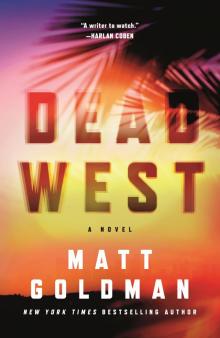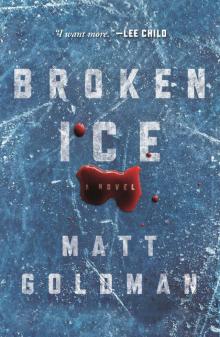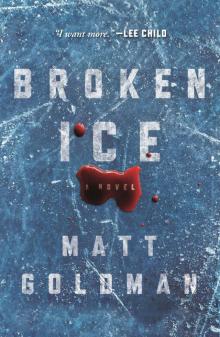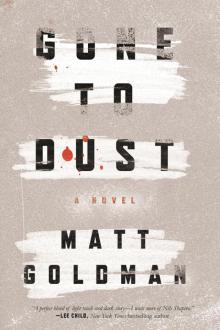- Home
- Matt Goldman
The Shallows--A Nils Shapiro Novel Page 12
The Shallows--A Nils Shapiro Novel Read online
Page 12
Melzer wore khaki pants and a button-down shirt, white with tiny windowpanes of blue. Both garments were wrinkle free, not because they’d been pressed, but because the cotton had been treated with something like embalming fluid. “I shouldn’t be talking to you like this,” said Dr. Melzer, “but I’m a few months away from retirement. What can they do to me?”
“Make you work a couple extra years.”
He smiled. “No thank you. And, I have to talk to someone. I’ve never seen anything like it.”
“Like the murders?”
“Well those, I’ve seen. Not exactly like the first one, with the vic tied to the dock by a stringer through his jaw. But I’ve never seen anything like the police work. Or lack thereof.”
“I’ve noticed that, too.”
Melzer stirred his caffeinated Slurpee with a straw through the hole in its dome-shaped lid. He took a sip then said, “The Greater Lake Minnetonka Police Department is usually top notch. I’ve dealt with them quite a bit. Boating accidents and drownings, mostly. People falling through the ice. The occasional homicide. But since their chief went AWOL, they’re just rudderless.”
“Incompetent?”
Melzer considered my question. I took a big sip of my frozen beverage and got walloped by brain freeze for the first time in twenty years. Melzer said, “Not overtly. They’re just not asking enough questions or the right questions and they’re not following up. I don’t even know if they’ve read my preliminary report.”
I said, “Greater Lake Minnetonka PD offered me a job consulting on the case. Anything I can do to help?” I left out the part about me turning down the offer.
“Well, since you’re working with them,” said Meltzer, “maybe you could help impress upon them the importance of the water in Todd Rabinowitz’s lungs.”
“It wasn’t lake water?”
“It was lake water,” said Melzer.
“That’s good, right? It proves Todd Rabinowitz drowned in the lake.”
“It proves Todd Rabinowitz drowned in a lake. I found milfoil in the victim’s lungs. That particular milfoil doesn’t live in Christmas Lake. But it does live in Lake Minnetonka. My guess is Todd Rabinowitz drowned across the highway, and then was moved.”
“And what did the police say when you told them that?”
“They said, ‘Thanks. We’ll look into it.’ But I got the sense they won’t. Maybe they’re overwhelmed. And after what happened in the house out there today…” He shook his head. “I’ll tell you one thing: if you want to kill someone, lure them into GLMPD’s jurisdiction. Chances are, you’ll get away with it.”
I nodded in camaraderie to keep Melzer talking. “What’s your gut on the bodies this morning?”
Melzer tucked his upper lip inside his lower then pulled them apart. “It looks like a murder-suicide, at least from a pathological point of view. The powder burns are where they should be, residue on the gun hand, splatter of blood and brain matter, but…” He did the thing with his lips again.
“But?”
“When you’ve seen forty years of bodies and crime scenes, sometimes you develop an intuition. And something feels off.”
A voice said, “Nils.” I turned toward the door. Anders Ellegaard stood in his Brooks Brothers suit. He wasn’t sweating. I don’t know how he accomplished that. He said, “I need to talk to you.”
I said, “Anders Ellegaard, this is Dr. Melzer, the Hennepin County medical examiner.” I gave him a what-the-fuck are you doing? look and said, “Dr. Melzer is working the Christmas Lake murders.”
Ellegaard nodded then shook Dr. Melzer’s hand. “Yes, I saw him this morning at the crime scene. I’m sorry to interrupt, Nils. But it’s important.”
Ellie was usually discreet and unreadable, but I saw concern. I said to Dr. Melzer, “Excuse me one moment.”
“Of course,” said Melzer.
I got up and met Ellegaard over by a rack of travel mugs and coffee-cozy grips. I was about to ask how he found me but remembered we at Stone Arch Investigations, as a safety precaution, set our phones to always know one another’s location.
Ellegaard said, “They came into the office looking for you.”
“They?”
“Two guys. Wouldn’t say who they were with. They asked a lot of questions about you.”
“What kind of guys?”
“Young, preppy. They’re looking for you, Shap. I tried calling but you didn’t answer. Saw you were here so I’m telling you in person.”
“Sorry, I silenced my phone.”
“I got a bad feeling about these guys. We need to deal with this.”
I returned to Melzer, explained I had an emergency and had to leave. He thanked me for the coffee, then I went to the counter and asked the barista if there was a back way out.
She wore heavy eyeliner and part of her head was shaved but I couldn’t tell if it’d been done by a stylist or a brain surgeon. She scratched the spiderweb tattoo that creeped above the collar of her T-shirt. I wondered where the spider was. She said, “You mean, like through the hospital?”
“Wherever.”
“Well, we get deliveries in back, but—”
Ellie and I walked behind the counter and into the stock room, which was lined with shelves filled with shiny bags of coffee beans. A door was marked Emergency Exit Only. It felt like an emergency so we opened it and stepped into a large indoor garage. Cars, ambulances, and half a dozen mid-sized trucks filled the parking spots.
Anders Ellegaard half-smiled. The former gold shield at Edina PD was out from behind his desk. It had become a rare occurrence because Ellie focused his efforts on bringing in new business and managing existing business. But my former fellow cadet wasn’t cut out for a desk job. That’s not why he became a cop. And it’s not why he walked away from his gold shield to start an investigations firm with me. Anders Ellegaard was too good of a detective to waste away in the blue light of a computer screen.
Ellegaard said, “Where are you parked?”
“On Sixth Street.”
“Let’s go up to the skyway level. If anyone followed you they’ll be waiting at your car.”
We took the stairs up to the second floor and found a skyway over Sixth Street where we could look down on my Volvo parked at a meter. It took ten seconds to spot the guys waiting for me. Khakis and dress shoes under rumpled oxfords with loosened ties. Preppy white boys with quasi-military haircuts and clean-shaven faces. The only two guys on the street not wearing shorts. One was blondish and wore his sleeves long, buttoned at the wrist, a bold show of heat tolerance. The other had a darker complexion, wore wraparound sunglasses, and his sleeves were rolled up above the elbow.
Ellegaard said, “Those are the guys who came into the office.”
“I don’t know when, but they must have stuck a tracking device on my car.”
“How do you want to handle this?”
I said, “Where did you park?”
“Sixth and Portland.”
“That will work.” I pulled out my phone, searched my contacts, and sent a text. Long time no talk. Want to make a quick $100?
A minute later I received a return text. U r getting cheap dude. What’s the job? And how quick?
Steal my car. Half an hour of work. But has to be right now. Where are you?
The U.
Perfect. I’m on 6th and Park. You in?
$200
If you fill it up with gas.
Fuck you.
:)
I found a dry cleaner on Seventh Street and talked myself into a free coat hanger, then Ellegaard and I met him on Fifth Avenue, two blocks north of my car.
Ernesto Cuellar had grown a sad excuse of a mustache since I’d last seen him in March. He’d lost the Southwest High School insignia–laden clothing and replaced it with baggy maroon basketball shorts, skate shoes, and a gray T-shirt. The sides of his head were clipped tight and the hair on top stood an inch long like brush bristles. He worked hard to suppress a smile when
he saw me. I handed him ten crisp twenty-dollar bills, and his smile won. He was seventeen, but with that big stupid grin on his face, looked twelve.
I shook Ernesto’s hand. “Good to see you, Ernesto. You taking classes at the U this year?”
“I’ll be taking three starting next month. My senior year I’ll be there full time.”
“A mere high school can’t contain your brain, huh?”
“You got that right.”
I said, “You think that mustache is working for you?”
“I know it is. Ten thousand college girls can’t be wrong.”
“How do you even know that reference?”
“I’m smarter than you, Nils Shapiro. Thought you’d be used to it by now.”
Ellegaard said, “I like this guy.”
“About time,” said Ernesto.
Last year, Ellegaard and I met Ernesto Cuellar when we disovered him camped outside my coat factory with his hands in his pockets. He kept his head in his hoodie and said he had a message for Nils Shapiro. When he refused to show his hands, Ellegaard pulled a gun on him.
I said, “I need you to walk a couple blocks up Sixth Street, pretend to use this coat hanger to open my car, get in, and drive away.”
“Easy. Where should I drive it?”
“I’ll call you and tell you.” I handed him the key fob. “Just give us a five-minute head start.”
He nodded. Ellie and I walked Seventh Street to Portland Avenue and took a right. I didn’t have to worry about Ernesto Cuellar doing his job. The kid was smarter than Silicon Valley. We approached Ellegaard’s Lincoln Navigator. I said, “Still got your tailing skills?”
He said, “Like riding a bike.”
We got in Ellegaard’s oven on wheels. He started the car, pulled into traffic, and a minute later we watched Ernesto Cuellar stick a straightened coat hanger into my car door along the window, jimmy it for a few seconds, open the door, and get in. The neckties seemed stunned and too stupid to realize the alarm should have gone off. They ran to a black Cadillac parked a few spaces back, pulled into the street, and followed Ernesto.
I said, “Idiots.”
“How’d you know they’d follow him?”
“I didn’t. Just thought they might.” I called Ernesto. “Still live by Powderhorn Park?”
He said, “Where else would I live?”
“Drive there. Park in front of your house. Go in. Job done. I’ll pick up the key later.”
Ernesto said, “So you just paid two hundred bucks for me to drive your wife’s station wagon to my own house instead of me taking the bus?”
“I don’t have a wife and shut up. It’s an SUV.”
“It’s a station wagon, dude. And why’s there a bunch of makeup and shit in the console?”
“That’s not makeup—it’s lip balm. I’ll see you later.”
Ernesto Cuellar circled around to Portland Avenue and drove south.
Ellegaard, always the dad, said, “We don’t know these guys. Maybe it’s safer to send Ernesto to a public place.”
“They’d just wait for him to leave and follow him home anyway. We won’t lose sight of him. We’ll keep him safe.”
Ernesto turned left on Thirty-first Street, continued a block and a half, and parked in front of his house. He got out and went inside without incident.
One of the neckties jumped out the passenger side of the Cadillac, used his phone to take a picture of my car, another of its license plate, and another of the house Ernesto walked into. He got back in the Cadillac. It drove off.
“Here we go,” said Ellegaard. He followed, hanging two cars behind the black Cadillac. We slugged through rush hour as if gum were stuck to the bottoms of our tires, a slow push and pause to 35W then west on Highway 62, which eventually bled onto Highway 212 and through the streets of Chaska. Ten minutes later, the Cadillac stopped in front of a large iron gate through which I saw an immaculate lawn sprawling to an old-school mansion. The kind with ivy on brick and statues and a fountain and circular driveway with a covered entrance to the front door.
Ellegaard said, “Nice place.”
“Eh. The utility bills have got to be murder.”
“If you can afford a house like that, utility bills aren’t your biggest concern.”
I said, “If you can afford a house like that, what is your biggest concern?”
“You might have a few.” Ellegaard smiled. “What are the odds Karin Tressler lives here?”
21
We drove a few blocks past the mansion then turned around and parked under the shade of a massive oak. The call came twenty-five minutes later. My caller ID read BLOCKED. Of course it did. I answered, “This is Nils.”
A man’s voice said, “I know who stole your car.”
I put the phone on speaker for Ellegaard. I said, “I think you might’ve dialed the wrong number.”
Ellegaard shook his head and smiled.
The man said, “Is this Nils Shapiro?”
“Yes. Who are you? What are you talking about?”
“I’m a Good Samaritan. Your car got stolen, right?”
“I don’t think so. Is this a joke? I got to go. I’m visiting a friend in the hospital.”
“Did you park your car on Sixth Street?”
“How do you know who I am and where I parked?” The caller hadn’t considered the possibility I didn’t know my car was stolen. Ellegaard laughed a silent laugh. The caller hesitated. I could hear he’d muffled the phone on his end, probably with a sweaty hand. I said, “Hello? Are you still there?”
Ten seconds later he said, “Uh, yeah. I saw someone steal a car on Sixth Street. I caught the license plate and traced it to you. I’m sorry to tell you the bad news.”
“How’d you trace the license plate? Do you work at the Department of Motor Vehicles?” Ellegaard gave me a thumbs-up. It was good to see him back where he belonged. Another muffled pause. Ellegaard found a pen and pad of paper in the driver’s-side door pocket and made a note.
The man returned. “I found it online. You can find anything online if you know where to look or who to pay.”
Ellegaard showed me his note. Excellent idea.
“Oh,” I said, “well, thank you. Did you call the police to report my car stolen?”
“Uh … not yet. I’m calling you first.”
“Huh. Well, thanks, I guess. But I’d better get off the phone and call the police.”
“Wait. I’m calling you because I followed your car when it got stolen. I know where it is.”
“But you didn’t call the police when you were following my car?”
“No. Listen. You’re kind of being an asshole. I’m just trying to help you get your car back.”
“Oh. I guess, yeah. Sorry about that. Where is it?” He gave me the address. I said, “Bad neighborhood?”
“Definitely.”
“Okay, then I won’t try to take it back. I’ll let the police do that. And uh, hey. I’d like to thank you. What’s your name?”
Another muffled pause, then, “No name. Just a good citizen doing what any other good citizen would do.”
I said, “All right, good citizen. Can I buy you a drink or cup of coffee sometime?”
Ellegaard nodded his approval. Another muffled pause, but not well. I could hear fragments of conversation. The man returned and said, “Uh sure, I’ll take you up on that. What are you thinking?”
“J.D. Hoyt’s at eight?”
Another muffled pause. “Great. I’ll see you there.”
I hung up.
I suggested J.D. Hoyt’s because of its close proximity to Target Field. The Minnesota Twins had a home game that night—the area and Hoyt’s would be crowded. Ellegaard drove me to Ernesto Cuellar’s then went back to the office. I knocked on Ernesto’s door. His mother answered. Late thirties, a kind face. She had just started dinner. She invited me to stay, but I took a rain check. Ernesto stepped out of his room, his noggin sandwiched between big headphones.
H
e handed me my key and said, “I took it out for a spin and filled the tank.”
“You know I was kidding.”
“Yeah, I know. But now you owe me.” He turned and went back into his room.
I said good-bye to Mrs. Cuellar then got in my Volvo. Ernesto had done more than fill the tank. A pair of red fuzzy dice hung from the rearview mirror, and a tiny plastic Jesus stood suction-cupped on the dash. I left Ernesto’s additions where he put them and headed home.
The coat factory was so hot it took five minutes to expel the lukewarm water from the pipes so I could take a cold shower. I changed into fresh khakis and a polo shirt. Micaela bought me a rainbow of them when we were married, but they all featured alligators. Beautiful shirts, but if you want me to advertise your brand, then pay me. Otherwise, forget it. Unless all my other shirts are dirty.
I drove to Arndt Kjellgren’s studio in Northeast. Gabriella Núñez had arranged for a uniform to meet me outside Kjellgren’s door. The uniform unlocked the place and let me have at it. I started with the albums Kjellgren had first suggested to me: the New York Dolls, Aretha, and Leonard Cohen. None of the discs recorded by those artists contained anything unusual inside the jackets. No documents. No notes. Nothing. I spent another hour spot-checking record albums and found nothing. It would take a full day to check them all. At least. I gave up, thanked the uniform, and left.
When I pulled up to the coat factory’s bay door, Susan Silver stood outside my building, looking at the brick, I guessed, for some kind of identifier. A sign. An address. Something.
I rolled down my window and said hello. Susan Silver turned to me and smiled. She wore a peach-colored skirt that fell just below the knee and a white sleeveless blouse. Her long gray hair glinted an eponymous silver when the wind found enough strength to move it.
I pulled into my loading dock and got out of the car. She had entered the bay and smiled something grave then said, “Nils.”
“Hello, Susan. Happy coincidence or are you looking for me?”

 The Shallows--A Nils Shapiro Novel
The Shallows--A Nils Shapiro Novel Dead West
Dead West Broken Ice
Broken Ice Broken Ice--A Novel
Broken Ice--A Novel Gone to Dust
Gone to Dust